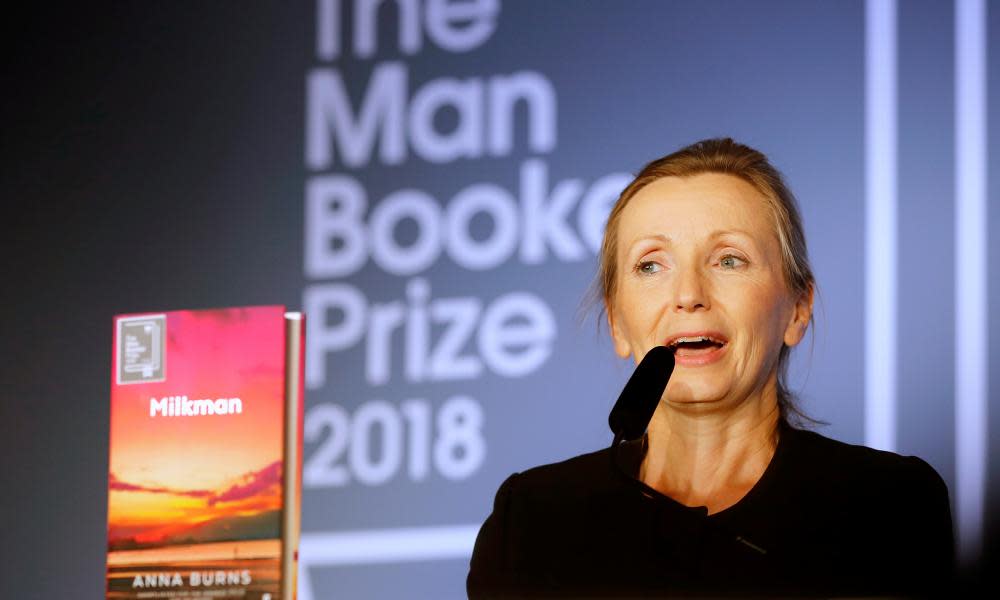Milkman is an essential novel for our times – every politician should read it

Today, very few British politicians admit to reading novels, let alone make a virtue of the fact – although Scottish first minister, Nicola Sturgeon, is a notable exception, and Jeremy Corbyn has named Ulysses as his favourite book. Perhaps Theresa May’s cabinet is full of secret bookworms. Somehow, I doubt it. But if there is one book that all British politicians ought to read right now, it is this week’s Man Booker prize winner.
Milkman, the third novel by Anna Burns, offers both an unnerving reminder of very recent Northern Irish history and a meticulous account of an oppressive relationship between an 18-year-old woman and a 41-year-old man. The novel, part of a Man Booker shortlist chosen at least partly for the book’s ability to parse the confusing state we’re in, holds up to the light two of the most pressing political and cultural questions of the moment – the Irish border and #MeToo.
All of which might make Milkman sound rather worthy. But potential readers, politicians or not, would do well to ignore the somewhat off-putting remarks made by the chair of the judges, philosopher Kwame Anthony Appiah, who, commenting on whether it was a “difficult” novel, compared the experience of reading it to taking “a walk up Snowdon”. Be reassured: reading Milkman is absolutely nothing like taking a walk up Snowdon – a feat of endurance for which, I gather, a torch, compass and a first-aid kit are recommended.
It is true that Milkman is not exactly a walk in the park – its scenery is too wild and intense for that. But it is engrossing, a book that engulfs you and keeps you held and mesmerised. Alongside its urgency and anger, it is also very, very funny, shot through with a biting, sometimes rather batty, wit that lets light filter into its otherwise dark matter.
Milkman has been called “experimental”, but its occasional departures from novelistic convention hardly qualify it for that label. It has very long paragraphs, an extremely distinctive and original narrative voice, and its characters are not given names, but rather known by descriptions. (“Milkman” is the nickname of the man obsessed by the narrator – no deliverer of milk he, but a dangerous paramilitary.) The book is lent a kind of mythic authority by its insistence on naming its characters not as themselves but only for how they figure – as “middle daughter”, “first brother-in-law” or “maybe-boyfriend” – in a claustrophobic, inescapable tangle of relationships.
Where Milkman succeeds especially well is in summoning up, in a manner entirely free from cliche, what the novel itself calls the “psycho-political atmosphere” of its setting – an unnamed town in Northern Ireland in the 1970s that is split down sectarian lines, runs on its own skewed and corrupted structures of power, and has its own tightly controlled conventions and rules. This is a society in which reading a 19th-century novel is seen as more subversive than carrying a gun, and in which your forename or choice of vocabulary instantly marks you out as coming from “over the road”, “over the border” or even “over the water”. Importantly for the novel – and indeed for all of us, now – it is these corruptions and disruptions that also empower “Milkman” in his predation of the narrator. The estrangement of a society from itself gives licence to all kinds of violence, including a toxic, threatening masculinity. For this, Burns has drawn from life; there are plenty of Northern Irish women who can attest to its truthfulness.
It is this vivid summoning-up of the character of Northern Ireland’s recent history that makes Milkman required reading for our politicians – particularly politicians with short memories, or those with the arrogance and sheer cruelty to suggest that Northern Irish peace could be blithely sacrificed on the altar of a hard Brexit. Novels prick the imagination and awaken emotion and empathy in ways that reports and briefings, however thorough and precise, cannot. Northern Ireland secretary, Karen Bradley, at the very least, could learn a great deal from its pages – she who last month said that before her appointment she had been utterly ignorant on even the most basic facts of Northern Irish politics (the fact that republicans vote for republicans and unionists for unionists had somehow passed her by, she admitted).
When the narrator of Milkman first appears, she is walking down the street reading Sir Walter Scott’s Ivanhoe – immersed in a world of fanciful English medieval history, a million miles away from the realities that surround her. Maybe the Troubles seem like a distant historical fantasy to some, locked away on some other island in some other time. But they are only just out of our eyeline, and their shadows play at our door.
• Charlotte Higgins is the Guardian’s chief culture writer

 Yahoo News
Yahoo News 
